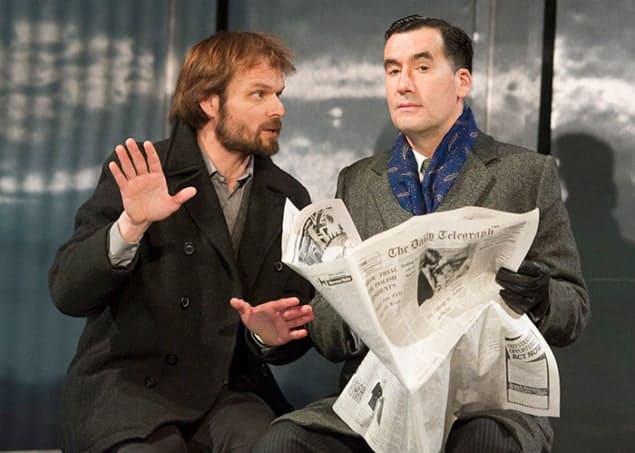Philip Ball reviews the play Hapgood, written by Tom Stoppard, directed by Howard Davies and performed at the Hampstead Theatre, London, UK

When Tom Stoppard called his play Hapgood “a period piece”, he meant that its ostensible subject matter – Cold War espionage – became history soon after the play premiered in 1988. Yet after seeing the recent revival of Hapgood at London’s Hampstead Theatre, it occurred to me that one could make the same observation about the quantum physics that furnishes the play with Stoppard’s characteristically cerebral metaphors. It’s not exactly that the science is behind the times – the familiar tropes of the double-slit experiment, uncertainty and the role of measurement remain central to quantum-mechanical discourse. But what quantum theory seemed to be about in 1988 is not the same as it appears in today’s interpretations, in which information, entanglement and nonlocality take precedence.
That doesn’t make Hapgood stale, though. Stoppard’s wit, intelligence and humanity transcend any datedness in the science; moreover, physicist theatre-goers can have fun spotting resonances with current preoccupations. When, for example, a briefcase containing intelligence secrets seems to have been tampered with despite having been made immune to detection-free prying, one thinks immediately of quantum cryptography. Similarly, the theme of twins that runs through the play – allowing a character to do one thing while apparently doing another – could, with only slightly more effort, be read today as an allusion to entanglement. While there’s no reason to think that these references were intentional, it’s perhaps not surprising that so inventive and astute a playwright would leave us room to read such things into the script.
The play’s eponymous heroine (played with verve by Lisa Dillon) is an agent for the British intelligence services who has to track down a mole in her department. The key suspects are a rather thuggish British spy, Ridley; and Kerner, a defected Russian physicist who is also, thanks to an old affair, the father of Hapgood’s young son, whom he has never met. The Americans, represented by a weary (presumably CIA) agent called Wates, are impatient for the Brits to get their house in order, while Hapgood’s boss, the supercilious and slippery Blair (Tim McMullan), is initially suspicious of Hapgood, but turns out to be playing a game of his own.
The plot’s twists and turns are intentionally bewildering, and Stoppard has said that one of his challenges in writing Hapgood was to make sure the audience can “differentiate the information it must remember from the information it doesn’t have to remember”. Science writing poses the same problem, and there’s arguably an up-to-the-minute quantum metaphor here, too. One information-based interpretation of quantum theory suggests that the limited information content of particles prevents fully entangled pairs from being “imprinted” with any state information beyond their mutual correlations.
The superficial difficulty of the plot is perhaps one of the reasons why Hapgood has not generally been regarded as a classic. It received lukewarm reviews when it first appeared, and doesn’t enjoy the kind of revivals afforded to Stoppard’s more celebrated “science play” Arcadia (1993), which drew on chaos theory. This elegantly staged production, directed by Howard Davies and scheduled to run until 23 January, fully justifies the decision to give it another chance.



